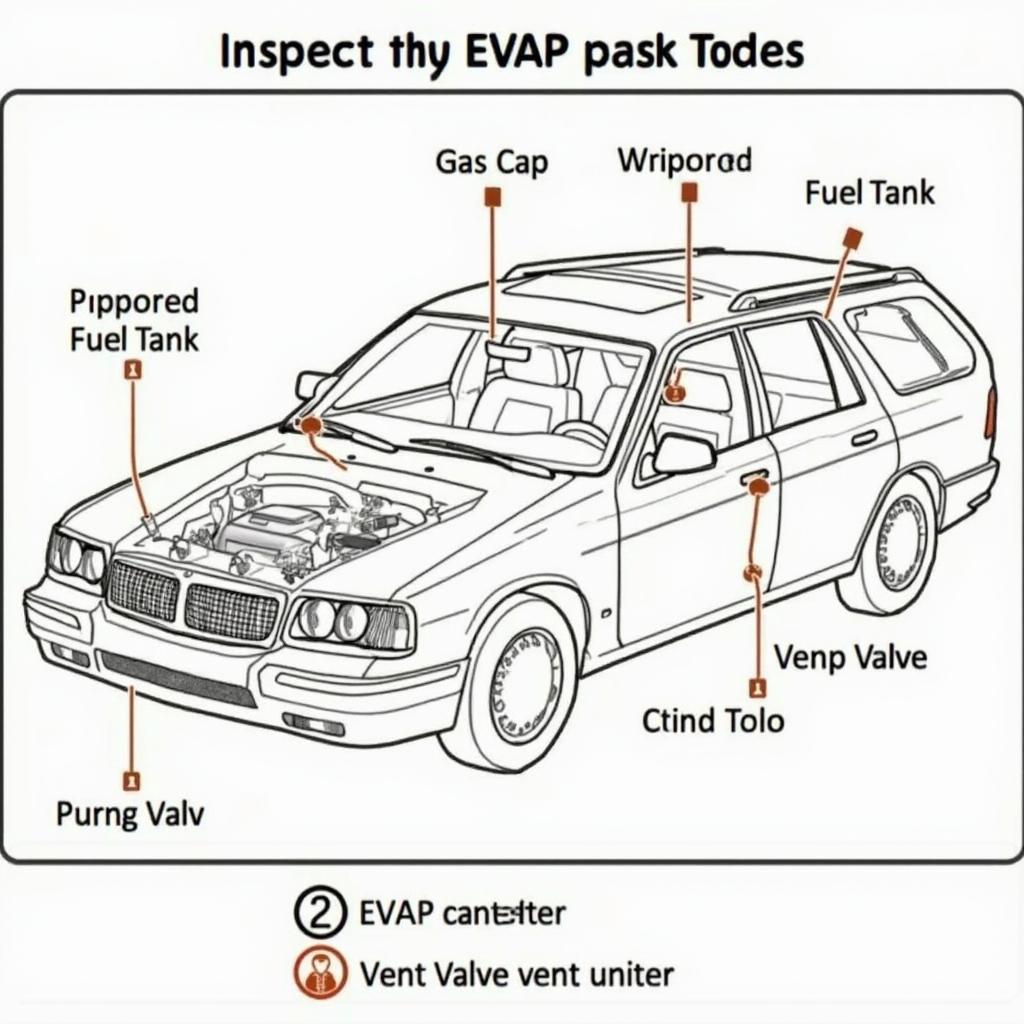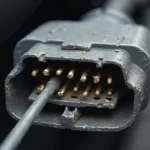The P0440 OBD2 code indicates a problem within your vehicle’s Evaporative Emission Control (EVAP) system. This system is designed to prevent fuel vapors from escaping into the atmosphere. Understanding the p0440 obd2 code definitions is crucial for efficient vehicle maintenance. A faulty EVAP system can lead to increased emissions, reduced fuel economy, and potential damage to other components.
The EVAP system is a complex network of components working together to capture and store fuel vapors. These vapors are then purged into the engine for combustion. The P0440 code specifically signifies a general leak, which can be tricky to pinpoint without proper diagnostic tools and knowledge. This can range from a loose gas cap to a more serious issue within the EVAP system itself. Finding and fixing the problem promptly is essential to maintain your vehicle’s performance and environmental impact. Having access to reliable resources, such as those found on OBDFree, can help you understand this code and take the necessary steps for repair. Check out information related to specific vehicles like 2001 obd2 codes.for chevy silverado.
What Does the P0440 Code Mean?
The P0440 code definition points to a general leak within the EVAP system. This means that somewhere in the system, fuel vapors are escaping. The leak can be small or large, and identifying its location requires a systematic approach. The code itself doesn’t pinpoint the exact location, but it serves as a starting point for your diagnostic journey.
Common Causes of the P0440 OBD2 Code
Loose or Damaged Gas Cap
One of the most common and easiest-to-fix causes is a loose or damaged gas cap. A properly sealed gas cap is essential for maintaining pressure within the EVAP system. Always check the gas cap first when encountering a P0440 code. Ensure it’s tightly secured and inspect it for any cracks or damage.
Faulty EVAP Canister Purge Valve
The EVAP canister purge valve controls the flow of fuel vapors from the canister to the engine. A malfunctioning valve can disrupt the system’s pressure and trigger the P0440 code.
Damaged EVAP Lines or Hoses
Cracks or damage to the EVAP lines or hoses can also cause leaks. These lines and hoses are susceptible to wear and tear over time, especially in harsh weather conditions. Inspecting them carefully for any visible damage is crucial.
Leaky Fuel Tank or Filler Neck
While less common, a leaky fuel tank or filler neck can also contribute to the P0440 code. These leaks are usually more complex to diagnose and repair, often requiring professional assistance.
Faulty EVAP Pressure Sensor
The EVAP pressure sensor monitors the pressure within the system. A faulty sensor can provide inaccurate readings, leading to the P0440 code being triggered even when there’s no actual leak.
How to Diagnose the P0440 OBD2 Code
Diagnosing the P0440 code can involve several steps, starting with a visual inspection of the gas cap, EVAP lines, and hoses. If no visible damage is found, using an OBD2 scanner can provide more specific information about the EVAP system’s performance. Further testing might involve a smoke test to pinpoint the leak location. For more specific OBD2 information on certain makes, you can check out resources like obd2 mini cooper 2003.
What Happens if I Ignore the P0440 Code?
Ignoring the P0440 code can lead to several problems. The most immediate concern is increased emissions, which can harm the environment. Additionally, a faulty EVAP system can negatively impact fuel economy, leading to higher fuel costs. In some cases, ignoring the code can also lead to damage to other components within the fuel system. You might want to consult information like toyota obd2 codes for more specific guidance.
How to Fix the P0440 Code
Fixing the P0440 code depends on the underlying cause. Simple fixes like tightening or replacing the gas cap can often resolve the issue. However, more complex problems, such as damaged EVAP lines or a faulty purge valve, might require professional repair. Resources like gm codes obd2 can provide specific information for certain car manufacturers.
Conclusion
The P0440 OBD2 code signifies a general leak in your vehicle’s EVAP system. Addressing this issue promptly is vital for maintaining optimal vehicle performance, minimizing emissions, and preventing further damage. Utilizing available resources and seeking professional help when needed can help ensure a proper and efficient repair, preventing future occurrences of the p0440 obd2 code. And remember, sites like OBDFree can be invaluable resources in your diagnostic journey. Additional information, like toyota 4runner obd2 codes, can provide specific guidance for different vehicle models.
FAQ
-
What is the EVAP system? The Evaporative Emission Control system prevents fuel vapors from escaping into the atmosphere.
-
What does the P0440 code mean? It indicates a general leak in the EVAP system.
-
Is it safe to drive with a P0440 code? You can typically drive short distances, but prolonged driving may cause further issues.
-
How much does it cost to fix a P0440 code? The cost varies depending on the cause and can range from a few dollars for a new gas cap to several hundred for more complex repairs.
-
Can I fix the P0440 code myself? Simple fixes like replacing the gas cap can be DIY projects, but more complex repairs might require a mechanic.
-
How can I prevent the P0440 code in the future? Regular vehicle maintenance, including inspecting the gas cap and EVAP system components, can help prevent future occurrences.
-
What other codes are related to the EVAP system? Other codes like P0441, P0442, and P0446 also indicate EVAP system issues, but they pinpoint different specific problems.
Here are some other common scenarios:
- Scenario 1: The check engine light comes on after filling the gas tank. This could indicate a loose or faulty gas cap.
- Scenario 2: You notice a strong fuel smell inside or around the vehicle. This suggests a possible EVAP leak and should be investigated promptly.
- Scenario 3: Your fuel economy suddenly decreases. This could be a symptom of various issues, including an EVAP system leak.
For further information on other OBD2 codes, you might find the following articles helpful: (List of suggested related articles on OBDFree).
Need help? Contact us via WhatsApp: +1(641)206-8880, or Email: [email protected]. We have a 24/7 customer support team available.


